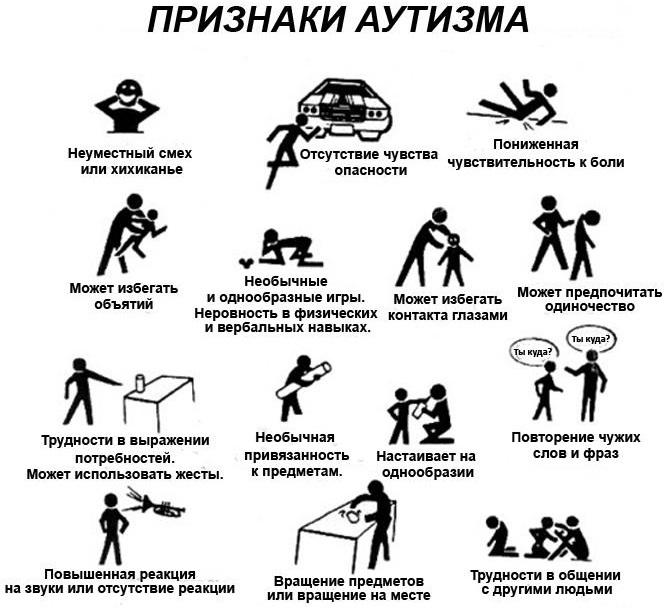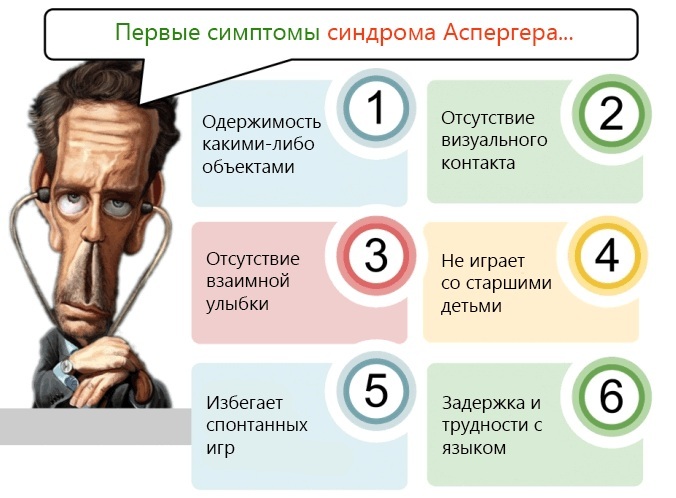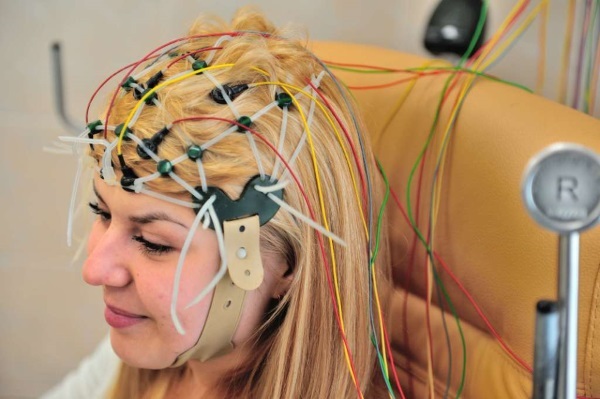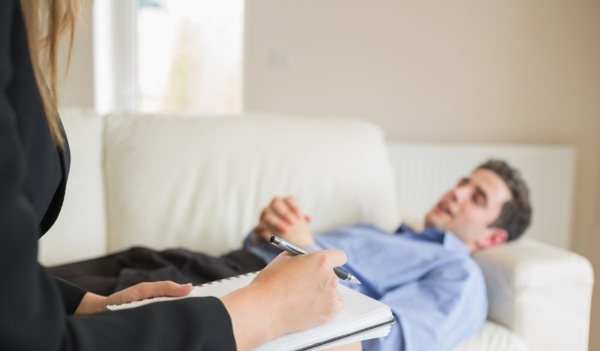Autism in adults more often occurs against the background of chromosomal changes in the central nervous system. The disease can proceed without pronounced symptoms. But sometimes mental disorders occur that last for a long time, which leads to the development of a pathological condition in adults. A person becomes overly conflicted, his usual way of life is disrupted.
Record content:
- 1 How autism manifests itself in adults
- 2 Autism in adult men and women: what are the differences?
- 3 Classification of degrees of severity
- 4 What causes autism
- 5 Difficulties faced by an autistic person
- 6 Diagnostics
- 7 Autism test in adults
-
8 How and how to help an autistic person
- 8.1 Drug therapy
- 8.2 Other therapies
- 9 Rehabilitation
- 10 Autism videos
How autism manifests itself in adults
The clinical picture in all patients is different, since each organism has individual qualities.
But there are a number of specific manifestations that help the doctor make a preliminary diagnosis:
| Name | Description |
| Social picture |
|
| Cognitive and communication sphere |
|
| Sensitive sphere |
|
| Disorder of function and imagination |
|

Many autistic people focus on specific topics. They masterfully do what they love, while completely indifferent to other areas. There are no physiological manifestations of autism; in some situations, there is a decrease in immunity and indigestion.
Autism in adult men and women: what are the differences?
Autism in adults is accompanied by a general clinical picture, but there are certain signs that are characteristic of patients depending on gender:
| Floor | Common Symptoms | Distinctive manifestations |
| Men |
|
|
| Women |
|
Adults with autism feel a certain amount of comfort in certain conditions.

A change in setting provokes an exacerbation of clinical signs:
- excitability, activity of the nervous system increases, mannered behavior appears;
- bodily contact provokes a strong mental reaction of an atypical form and is accompanied by increased irritability;
- cognitive functions are impaired and, in combination with poorly developed intelligence, the situation is aggravated;
- the patient's behavior is stereotyped, monotonous, the mood changes for no apparent reason.
Due to the numerous clinical symptoms, others can identify a person with autism in the first minutes of interaction with him. The patient makes cyclical body movements, avoids eye contact and does not understand what is being discussed during a conversation with the interlocutor.
Classification of degrees of severity
Autism in adults (symptoms depend on provoking factors and individual characteristics of the human body) is a psychological disorder. The main cause of the disease is disturbances in the functioning of the brain.
In medicine, the following degrees of severity of adult autism are distinguished:
| Name | Description |
| Easy | A person is able to communicate, but in an unfamiliar environment he gets lost, embarrassed. With a mild degree of autism, the patient moves slowly, talks. |
| Average | The form of the disease, in which a person speaks more, answers questions poorly. |
| Heavy | The patient manifests panic attacks, suicidal thoughts, especially if everything around him is new. |
There are also certain forms of autism in adults, given the severity of the pathological changes:
| Name | Description |
| Kanner's syndrome | A severe form of pathology, accompanied by pronounced symptoms. Speech skills are weak or may be completely absent due to atrophy of the speech apparatus. Social adaptability is at a low level, the nervous system is not developed. The same goes for IQ. Patients with Kanner's syndrome are not adapted to independent living. Severe cases require hospitalization of the patient. |
| Asperger's disease | There are some problems in establishing social contact with others, but the patient speaks well. He can get to know each other and keep the conversation going. Cognitive abilities are well developed. Of the external signs of autism, a closed character, clumsiness can be distinguished. Many people with Asperger Syndrome lead full-fledged independent lives. They also get a job, support activity in various public affairs.
|
| Rett syndrome | The hereditary form of the disease of a chronic nature is more often diagnosed in women. The first symptoms are diagnosed at an early age, starting from one year. Treatment will help smooth out the clinical picture. Most women with Rett syndrome live no more than 30 years. |
| Atypical autism (combined form) | The disease is more often mild. Differentiating the combined form is not always possible. |
Adult autism is also classified according to the nature of the manifestation and the interaction of the patient with the outside world:
| Name | Description |
| 1st group | A category of patients who do not contact at all with the outside world. |
| Group 2 | Sick, introverted people who spend all their free time doing the same thing. |
| Group 3 | Patients ignore social norms and orders because they do not understand them. |
| 4 group | Adult patients who cannot overcome certain obstacles, as a result of which they resent the world around them for a long time. |
| 5 group | Patients are characterized by high intellectual abilities. They are able to adapt to their environment and communicate with people at their level. They easily study and master certain professions, they even work in an intellectual direction. |
Special diagnostic measures, which are prescribed by a psychologist after a preliminary examination of the patient, will help to determine the severity and form of autism. Taking into account the results of medical examination, the patient is selected individual therapy, depending on the person's condition.
What causes autism
Most experts are inclined to believe that autism develops against the background of abnormal intrauterine changes in the formation of the central nervous system.
There are the following provoking factors that contribute to the onset of pathological processes:
- negative impact on the fetus during intrauterine development;
- severe stress;

- negative influence of surrounding factors;
- an unexpected change in the usual way of life;
- emotional disturbances, disruptions, instability;
- bad habits;
- long-term troubles at work, at home.
Often the trigger is a hereditary cause. Doctors are sure that it is not genes that provoke the pathology, but certain prerequisites increase the likelihood of developing the disease.
Improper parenting of a child, attention deficit on the part of adults in the future increases the risk of developing acquired autism in adults.
This is facilitated by the following provoking factors:
- depressive disorders present for a long time;
- various diseases of a psychological nature;
- traumatic brain injury.
The pathogenesis of the disease is not fully understood, but all of the listed sources are indirect, which contribute to the onset of the disease in adults.
Difficulties faced by an autistic person
Autism in adults (signs of pathological processes require special tests to establish accurate diagnosis) manifests itself in various symptoms, it all depends on the severity of the pathological changes. Sick patients face many challenges to be aware of. to help them adapt to the world around them:
| Name | Description |
| Connections and feelings | It is more difficult for an autistic to realize their emotions and connections. It is also difficult for a person to perceive others. Patients avoid eye contact. They are unable to cope with non-verbal communication. To outsiders, autistic people seem insensitive and cold. |
| Victim of bullies and offenders | Autistic people with poorly developed speech do not understand the place of the conflict, moreover they cannot stand up for themselves. This is the main reason for the mistreatment of others. |
| Presence of stereotyped movements | Rotation with fingers, palm, claps of hands on the table. The autistic person also makes erratic body movements.
|
| Delayed cognitive development | Self-service skills are lacking. |
Social norms are difficult for patients with autism, so they can accidentally offend any person, thereby alienating society. Patients do not feel bodily boundaries and may be too close to another person, which also provokes the discontent of others.
Diagnostics
A psychiatrist will help determine the disease and confirm the diagnosis. The patient himself turns to the doctor or his relatives, if it is not possible to establish contact with the person. Close people will also help the specialist by describing the patient's behavior and condition.
The following tests are prescribed to diagnose autism in adults:
| Name | Description |
| RAADS-R | The study helps to exclude or confirm the development of neurosis, schizophrenia or depression. |
| Aspie Quiz | The test includes 150 questions that must be answered by the patient. |
| Toronto alexithymia scale | External stimuli are used for examination. The results will help assess the functioning of the somatic and nervous systems. |
| SPQ | A diagnostic method that is necessary to exclude a schizotypal condition. |
| EQ | The emotional state of the autistic is assessed. |
| SQ | The survey helps to determine the level of empathy and tendency to organize. |
| Electroencephalography | Diagnostics allows you to exclude epileptic foci. |
| Ultrasound examination (ultrasound) | The brain and its parts are examined for damage or abnormal developments that provoked pathological processes. |
| Audiometry | Research allows you to assess the condition of hearing. |

It is important to differentiate the disease, since autism is accompanied by numerous symptoms similar to the manifestations of other psychological diseases.
The diagnosis and treatment is carried out by a psychiatrist. But given the provoking factors and the degree of development of the pathology, additional advice from other specialized specialists (neurologist, psychologist, nutritionist, speech therapist, massage therapist) may be needed.
Autism test in adults
Autism in adults (signs of the disease appear on an individual basis, depending on characteristics of the human body) can be found at home, it is enough to special test. Ask the person to fix their gaze on the chosen object. If the object has aroused great interest in the patient and concentration of attention, it is necessary to go to the hospital and undergo an examination.
In the early stages, autism resembles "eccentricity", so few people pay attention to it. Each person's behavior is individual and only clinical examinations can diagnose the disease.
How and how to help an autistic person
Treatment is selected by a psychologist after receiving the results of medical diagnostics. The main goal of therapy is to help a person adapt in a social environment, restore the quality of life and prevent aggression towards people around him.
Drug therapy
A mild form of autism can be corrected with the help of a psychologist. In severe cases, drug therapy will be required.
| Drug group | Name | Efficiency |
| Antidepressants | "Fluoxetine", "Sertraline" | Medicines normalize mood, eliminate anxiety and irritability. |
| Stimulants | "Guanfatsin", "Atomoxetin" | The funds improve the patient's mood, increase the ability to concentrate. |
| Antipsychotic drugs | Haloperidol, Sonopax | The drugs help reduce aggression and outbursts of anger. |
Medicines suppress irritability, reduce aggressive mood. The dosage of drugs depends on the severity of the pathological processes.
The psychiatrist prescribes the funds, he also monitors their intake and adjusts the treatment if necessary. Do not give drugs to patients on their own, as they cause severe side effects (insomnia, drowsiness, weight loss).
To help a patient with autism, relatives need to learn to find an approach to the person, show more care, and behave correctly.
There are certain tips from a psychologist that will help you connect with the patient:
- It is important to maintain constant contact. Otherwise, the patient will withdraw into himself.
- Help the patient cope with fear and aggression, suppress these feelings.
- Role-playing games, where you can use a large number of toys, will help to establish contact.
- It is necessary to teach a person independence, gradually instill in him the skills of self-care.
- Maintain the functioning of the speech apparatus with long conversations, discussions, conversations on a general topic.
- Teach the patient to show emotion, joy, or empathy.
- To avoid provoking stress, avoid a change of scenery.
- Talk calmly, avoid aggression and swearing in communication, do not conflict.
- The patient should be addressed clearly and distinctly, but not raising his voice so as not to scare him.
- It is important for a person to create the most favorable conditions for existence in order to provide comfort and prevent stress.
- Plan to visit a speech therapist, psychologist, psychiatrist, neurologist for preventive or therapeutic purposes.

Experts recommend treating people with autism on an equal footing. These are people whose personality is full, it has its own worldview and inner world. It is important to avoid conflicts, be patient and understand.
Other therapies
Autism in adults (signs of the disease will help to choose the most effective treatment) also involves the use of other methods of treatment:
| Name | Description |
| Behavior correction | Applied Behavior Analysis - Applied Behavior Analysis. The technique helps to develop certain skills and knowledge in the autistic person so that the patient can calmly adapt in society. |
| Speech therapy with a speech therapist | The treatment improves the patient's speech, psyche and develops communication skills with the people around them through emotional contacts. |
| Occupational therapy | Helps improve motor skills and motor coordination. Occupational therapy also teaches to use the information received from the outside world through the senses (sight, hearing, smell, touch). |
| Play therapy | Speech skills improve, the patient learns to communicate with people and adapt in society. Specially designed games allow you to identify the problems of the autistic and help him overcome them. |
| Visual therapy | Video images help connect with the autistic person with assistive communications (favorite pictures). |

Treatment in each case is selected individually. It all depends on the state of the person, the degree of development of autism. It is important to regularly engage and use the services of professional specialists.
Rehabilitation
The rehabilitation program for numerous specialized centers includes the following areas:
| Name | Description |
| Classes with a speech therapist | The specialist helps to develop speech, phonetics. Helps to train the skills of speech contact. |
| Neuropsychomotrics | The patient is helped to adapt to society, the world around him, he is taught socialization and communication, and also to develop fine motor skills. |
| Classes with a psychologist | The doctor helps to correct the behavioral response, teaches relatives to deal with an autistic patient. The specialist develops an individual socialization program for each patient. |
| Physiotherapy (exercise therapy) | During the game, patients contact physiotherapists, develop skills of movement, statics and muscle tone. |
Special rehabilitation classes help to get rid of anxiety, improve psychological and physical fitness. The concentration of attention increases, patients learn to adapt in a social society.
Timely diagnosis of autism in adults helps to smooth out the symptoms of the disease. A person can return to a socially active lifestyle without the round-the-clock assistance of relatives or medical personnel. Without qualified help, the disease will progress, and the person's condition will worsen.
Article design: Vladimir the Great
Autism videos
Autism in adults. Symptoms, causes, treatment:



